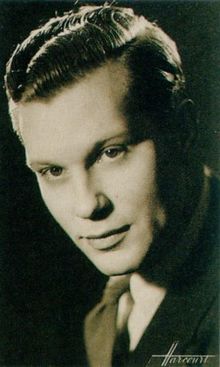Robert Hugues-Lambert
Robert Hugues-Lambert (born April 1, 1908 in Paris , † March 7, 1945 in Flossenbürg concentration camp ) was a French actor and victim of the Nazi regime.
Life
Hugues-Lambert had already gained stage experience when he was offered the title role of the aviator and aviation pioneer Jean Mermoz, who was killed in a plane crash in 1942, in the film drama of the same name. It is a film biography about the founder and organizer of airmail in South America and the first pilot who flew over the Andes . It was to remain Hugues-Lambert's only canvas production.
Shortly before the end of the shooting, he was arrested by the Gestapo in a Paris bar, a well-known meeting place for Parisian homosexuals, and taken to the Drancy transit camp via Compiègne- Royallieu . His role was taken on by Hugues-Lambert's colleague Henri Vidal , who looked fairly similar and was mostly photographed from behind and from a distance. In order to provide Vidal's remaining role text with the voice of Hugues-Lambert, the film's producer, André Tranché, made various attempts to get to the actor who was interned near Paris by bribing a guard. Hugues-Lambert could not be released, but he spoke his remaining text into the microphone of the sound engineer who had come along, and the film, which opened in Paris on November 3, 1943, could still be completed.
Hugues-Lambert himself stayed in France for some time and was only deported to Germany a few weeks before the premiere of Mermoz - on September 18, 1943 to the Buchenwald concentration camp and from there to the Flossenbürg concentration camp on November 28, 1944. There, inmate no. 39317 was sent temporarily to the Königstein satellite camp, the so-called Rathen Schwalbe commando, where he had to do heavy work underground in refineries for the production of synthetic fuel. Completely exhausted, the Frenchman, who was soon classified as unable to work, returned to Flossenbürg on February 27, 1945, where he died a good week later.
Excerpts from the tragic life of this actor were the focus of the 1998 film Le plus beau pays du monde , a Franco-German-Swiss docu-drama with satirical undertones from the hand of the director Marcel Bluwal.
literature
- Kay Less : Between the stage and the barracks. Lexicon of persecuted theater, film and music artists from 1933 to 1945 . With a foreword by Paul Spiegel . Metropol, Berlin 2008, ISBN 978-3-938690-10-9 , p. 185.
Web links
- Robert Hugues-Lambert in the Internet Movie Database (English)
| personal data | |
|---|---|
| SURNAME | Hugues-Lambert, Robert |
| BRIEF DESCRIPTION | French actor and Nazi victim |
| DATE OF BIRTH | April 1, 1908 |
| PLACE OF BIRTH | Paris , France |
| DATE OF DEATH | March 7, 1945 |
| Place of death | Flossenbürg concentration camp |
